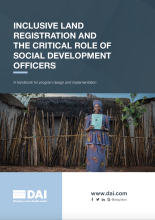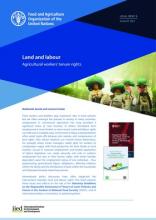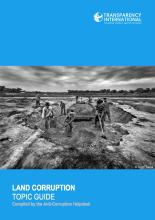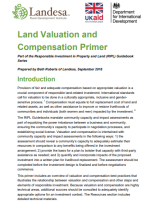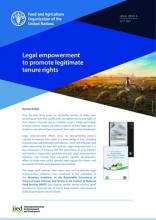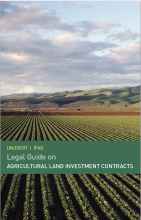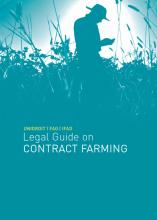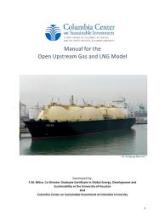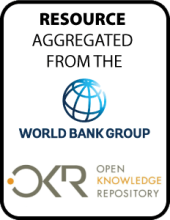Resources for Government
Inclusive Land Registration and the Critical Role of Social Development Officers
This guide identifies lessons learned and outlines critical steps that countries can apply to their own rural land administration programs as they strive to ensure these programs become more gender and socially inclusive. The document provides a valuable learning resource to help governments and communities implement inclusive land programs.
Land and labour
Land and labour rights can intersect in multiple ways. Investments in large-scale plantations often entail trade-offs between job creation and compressions of land rights. Also, labour relations can involve tenure dimensions, for example where estate managers sublet plots for workers to complement wages with food production for their family or local markets.
Casual or seasonal employment and limited application of labour legislation can create precarity not only in workers’ employment but also in their tenure rights, with entire families dependent upon the employment status of one individual – thus perpetuating generational labour obligations, affecting relations within the family and the distribution of tasks within the household, and disproportionately impacting women. International policy discourses have often neglected these intersections.
Land Corruption - Topic Guide
This topic guide presents an overview of land corruption in rural and urban areas, focusing on:
- the social costs of corruption in land governance and the forms that corruption takes at different levels of land governance such as policy making, legal processes and administrative processes.
- the different ways in which land corruption is being counteracted. To illustrate how those anti-corruption approaches are being implemented, it includes successful experiences from all around the world with concrete ideas to fight land corruption.
The guide then compiles a list of resources to learn more about the topic, including background studies, standards and guidelines, data sets and a list of main stakeholders and actors working on the issue from different perspectives; as well as handbooks and tool-kits with practical suggestions to implement in the field.
Land Valuation and Compensation (Responsible Investment in Property and Land (RIPL) Guidebook Series)
This primer includes an overview of valuation and compensation best practices that illustrates the relationship between valuation and compensation and other steps and elements of responsible investment. It describes how to develop and implement valuation and compensation practices that lead to fair and adequate compensation to the community and individual land users impacted or displaced by an investment. It is intendend for government agencies and private sector actors.
Legal empowerment to promote legitimate tenure rights
Over the past 30 years, an increasing number of states have passed good laws that significantly strengthen the tenure rights of their citizens. However, due to multiple barriers, a high percentage of many nations’ citizens are either unaware of their legal rights or unable to use national laws to protect their rights when threatened.
Legal empowerment efforts focus on strengthening citizens’ capacity to exercise their rights in a wide variety of forums, including in government administrative procedures, courts and tribunals, and when advocating for laws and policies. Legal empowerment is a key component of ensuring that the governance of land, fisheries and forests is responsible, equitable and just. Legal empowerment initiatives may include legal education; capacity development; efforts to shape state justice systems; legal support for citizens; and promotion of citizen participation in law-making.
Legal Guide on Agricultural Land Investment Contracts
Investment in agriculture is essential for sustainable development, in particular for achieving food security, adequate nutrition, decent employment, poverty reduction and environmental protection. In seeking to attract agricultural investment, many governments and local communities have entered into Agricultural Land Investment Contracts (ALIC). Mindful of the contractual challenges involved and considering the importance of enhancing knowledge of the legal regime applicable to agricultural land investment operations, the International Institute for the Unification of Private Law (UNIDROIT) in collaboration with the International Fund for Agricultural Development (IFAD) have prepared this UNIDROIT/IFAD Legal Guide on Agricultural Land Investment Contracts (ALIC Legal Guide).
Legal Guide on Contract Farming
This guide provides guidance for producers, governments, legal advisors and civil society on contract farming arrangements, from negotiation to conclusion, including performance and possible breach or termination of the contract. It gives a description of common contract terms and a discussion of legal issues and critical problems that may arise under various practical situations, illustrating how they may be treated under different legal systems.
Manual for the Open Upstream Gas and LNG Model
This manual has been developed for training purposes. It models the gas value chain from the upstream project to the use of gas under the form of LPG, LNG or as feedstock for local industrial or power generation uses. It allows users to assess different LNG structures that can be considered when producing LNG (see section 2 for an explanation of each structure). It provides various fiscal regime options for the upstream and mid-stream sectors to understand the impacts of changes on the government take and the private sector returns.
Mining Community Development Agreements : Source Book
The aim of this document is to support strategic and collaborative community development planning by governments, companies, civil society, and communities by presenting a basic framework for Community Development Agreements in the context of the mining industry. In particular, this document is a tool for governments and policymakers at all levels, as they strive to support their communities—economically and socially—through the sustainable development of mineral resources. It should inform policymakers of the process and content of best-practice CDAs, allowing improved results from CDA development.
This resource is part of the CCSI’s Directory of Community Guidance on Agreements Relating to Agriculture or Forestry Investment.
Monitoring Scheme for Monitoring Large Scale Agricultural Investments in Ethiopia
This manual illustrates a monitoring scheme for monitoring large-scale agricultural investments. It aims at providing orientation for establishing a monitoring scheme and implementing monitoring activities in the framework of LSAI with the collaboration of the authorities responsible for leasing out land to agricultural investors and supervising related activities. While focused on Ethiopia, it will be a useful resource for other countries too.


